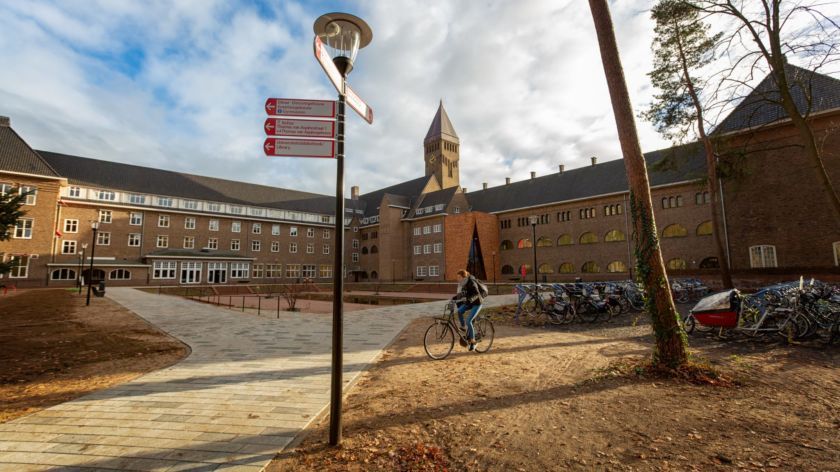‘A President of the Executive Board with a heavy political office impinges on the university’s independence’
-
 Berchmanianum. Photo by Dick van Aalst
Berchmanianum. Photo by Dick van Aalst
OPINION - Heavy political office is incompatible with a position as university administrator. According to Paul Bovend'Eert, Professor Emeritus of Constitutional Law, this impinges on the independent position of a university. He therefore calls on new President of the Board Alexandra van Huffelen to give up her position as party chair.
Last week it was announced that Alexandra van Huffelen has been appointed as the new President of the Executive Board of Radboud University in Nijmegen. In the Rutte III and Rutte IV cabinets, Van Huffelen was respectively State Secretary for Kingdom Relations and Digitalisation and State Secretary for Finance, Surcharges and Customs on behalf of D66. In the press release about her appointment, she was referred to as ‘an experienced administrator with a strong network who is a good fit for our university thanks to her decisive and connecting style focused on collaboration.’ You would think such a person would be an ideal fit for the position!
However, the press release did not mention that the new President was about to be elected as the new party chair of D66. Van Huffelen herself believes that she is a ‘good match’ for the university. She considers the presidency of D66 to be practically and substantively easy to combine with her position as university administrator.
Mixed reactions
The appointment prompted mixed reactions. Some felt disappointed that the new President had not been drawn from the university community, while others welcomed the appointment of an active and experienced politician. For example, Radboud University Professor of Economics and party chair of PvdA Esther Mirjan Sent noted in a response to Vox that she is delighted that Van Huffelen will soon also be a fellow party chair.
Opinions may differ as to whether the new President can deal with the practicalities of a heavy party-political office (16 hours a week) alongside her full-time position as university administrator. The question is also, however, whether it is acceptable for a senior university administrator to also hold a major political office. Doesn’t such a combination of positions lead to the risk of political influence affecting academic higher education and research? Or does it not at least give the appearance of such influence, thus compromising the essential independence of the university as an academic institution of research and education?
Independence
The Higher Education Act stipulates that university institutions must promote academic freedom. Lecturers, researchers, and students should be free to follow their own scientific insights in their teaching, research, and schooling, and remain independent of specific political views.
For academic freedom to be realised, it is essential that scientists can independently shape their teaching and research and work together, free from pressure from politics, the industry, civil society, or public opinion. This means that they should not be pressurised to integrate non-scientific considerations (of a political or commercial nature) in their work. Independence is thus an important prerequisite for academic freedom. The Code of Conduct for Research Integrity sees independence as one of the five core elements of university activities.
In this context, it is worth noting that important political positions (not merely party membership) can certainly, under certain circumstances, be problematic for scientists. Consider, for example, a scientist who holds a political office and is responsible for policy-making in a particular field, while at the same time conducting scientific research in the same policy area. This puts the independence and impartiality of research at stake. Such a combination of positions is untenable in terms of academic freedom.
Influence from politics
Unfortunately, there are plenty of examples in Dutch practice of such combinations of positions at universities. It is high time to emphatically put into question this form of real or apparent political influence. Until recently, the discussion mainly focused on unwanted mixing of university positions with positions in the industry, but influence from political offices also clearly deserves attention.
The question now is whether such requirements of academic freedom and independence should also be imposed on university administrators. In my opinion, there is a lot to be said for this. The times when the Executive Boards of universities did nothing more than perform administrative management tasks are long gone. Dutch universities have become true management organisations, with administrators intrusively interfering in academic higher education and research, providing guidelines and developing strategies for study programmes and research projects.
Resigning from political office
In this context, it is more or less self-evident that those administrators should also comply with standards of academic freedom, independence, and academic integrity. Holding heavy political offices, such as chairmanship of a party, is incompatible with the position of university administrator, no matter how amazing the relevent person’s networks and administrative experience are in practice. The appearance of partisan influence is always lurking.
The university’s independence as an academic institution of teaching and research is compromised. That is not acceptable. The new President of the Executive Board should therefore resign from her political post. This will also give her more time to safely steer Radboud University through the difficult times ahead.




